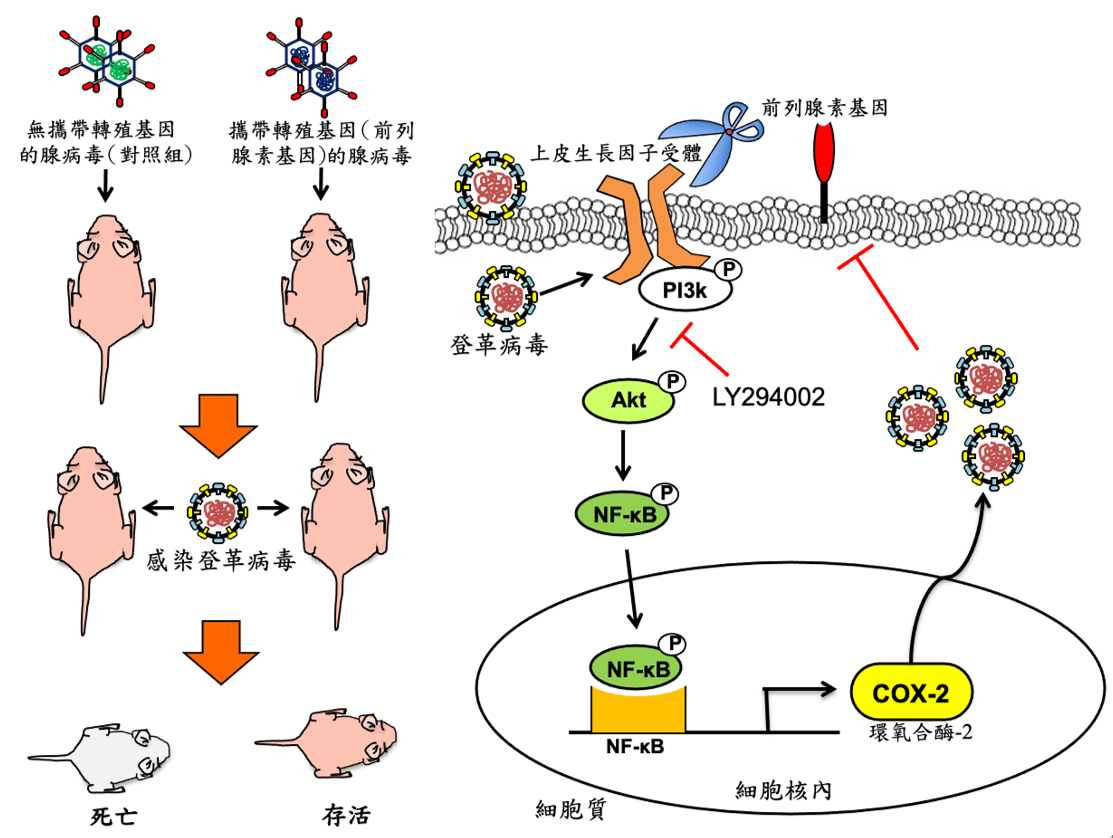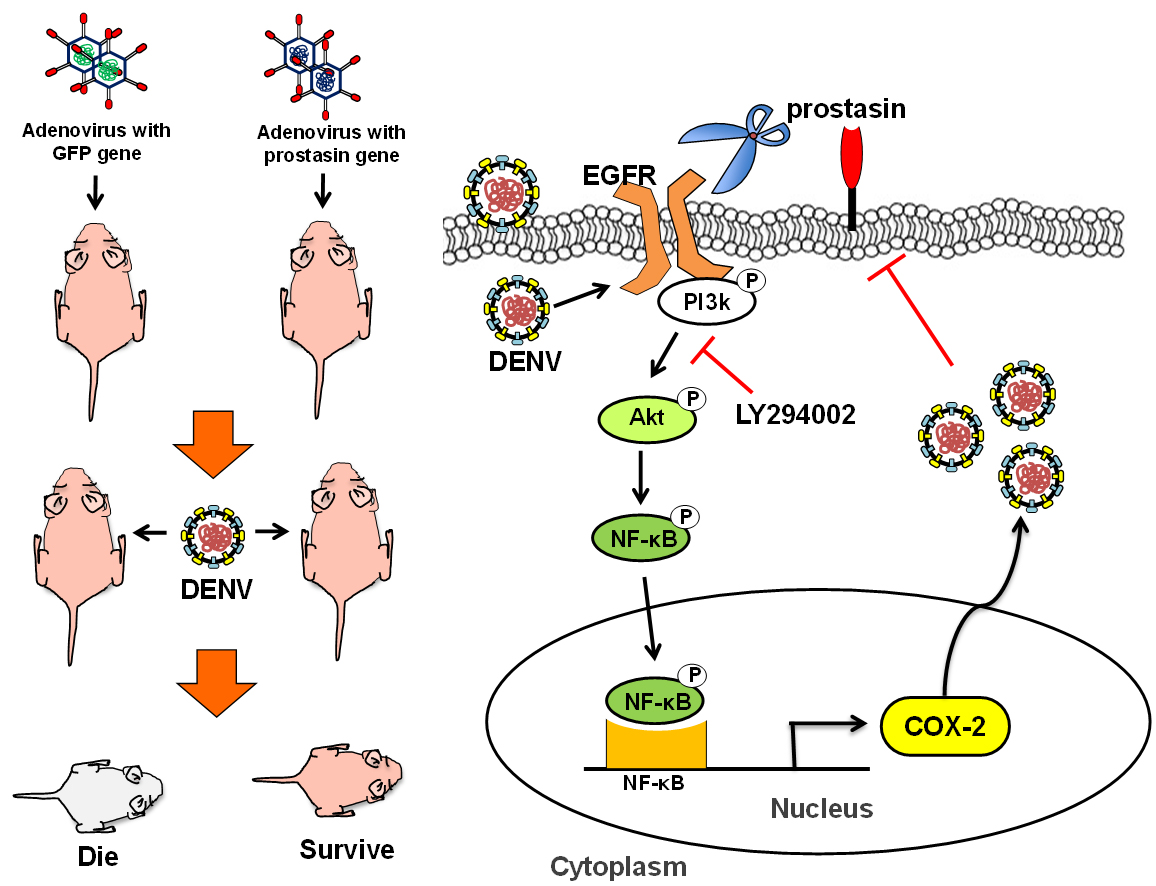擾亂登革病毒增殖的殺手:前列腺素(Prostasin)基因
擾亂登革病毒增殖的殺手:前列腺素(Prostasin)基因
登革病毒是藉由蚊子傳播的病毒,埃及斑蚊(Aedes aegypti)或白線斑(Aedes albopictus)是最主要的病媒蚊,登革病毒感染會導致威脅生命的疾病,例如登革出血熱或登革熱休克症候群。在熱帶和亞熱帶地區是一個嚴重的公共衛生問題,台灣位於熱帶和亞熱帶地區的交界處,每年都有登革病毒感染病例,特別是在台灣南部,在2014年至2015年,台南和高雄就曾經爆發登革病毒感染,感染病毒的人數分別超過一萬和兩萬多人,且造成百餘人死亡。目前並尚未有有效的疫苗和藥物用於預防和臨床治療,因此,尋找具有抗登革病毒感染之潛力藥物標靶是重要的研究議題。眾所周知,病毒是一種寄生的病原體,也就是說,病毒的增殖需要依賴宿主基因表達的支持。在過去數年中,高雄醫學大學李景欽教授和陳彥旭醫師合作致力於了解登革病毒複製機制並尋找引起登革熱疾病的標靶基因。根據臨床檢驗分析,研究團隊首先發現,相較於健康個體,登革熱患者血液樣本中前列腺素(prostasin) (一個細胞膜蛋白酶)的表達量較低,並進而揭示前列腺素表達量跟登革病毒RNA感染量呈現負相關,意即,病毒感染量越多,前列腺素量越少。而回到實驗室進行一系列的細胞學實驗,結果顯示登革病毒感染確實會顯著降低前列腺素基因表現量。因此,研究小組認為登革病毒感染會抑制前列腺素表現的原因是因為前列腺素會對病毒登革病毒的增殖產生干擾作用。為了證明這個假設,研究小組在登革病毒感染的細胞或小鼠中大量表達外源性的前列腺素,結果發現大量表達的前列腺素確實可以抑制病毒增殖並保護小鼠免於受登革病毒感染的死亡威脅,意即減緩老鼠的死亡率。由進一步的抑制機轉的研究顯示,前列腺素對登革病毒增殖的抑制作用是藉由抑制上皮生長因子受體(epithelial growth factor receptor; EGFR)的表達,進而導致Akt /NF-B調控的環氧合酶-2(cyclooxygenase-2; COX-2)訊息路徑受到抑制。先前研究小組的研究已經證實登革病毒增殖需要COX-2訊息路徑的活化。同時根據報導,EGFR活化路徑會擾亂細胞干擾素(Interferon)的抗病毒反應,進而達到幫助病毒增殖的目的。因此,前列腺素透過降低EGFR的表達,進而恢復干擾素和干擾素所誘發的抗病毒基因的表達,包括2'-5'-寡腺苷酸合成酶1 (OAS1),OAS2,OAS3和雙鏈RNA依賴性蛋白激酶(PKR)而達到抗病毒目的。總之,我們的結果證明前列腺素的表達是一個值得做為臨床診斷標記的特徵,同時也提供治療登革病毒感染的潛在靶標。
圖形摘要

前列腺素藉由降低EGFR蛋白進而抑制登革病毒複製的模型。
1. 前列腺素的外源表達保護老鼠免受登革病毒感染造成的的死亡並抑制病毒的繁殖。
2. 前列腺素的抗病毒機制是降低上皮生長因子受體(EGFR)的表達量,導致抑制Akt/NF-B所調控的環氧合酶2(COX-2)訊息傳遞路徑而不利於病毒增殖。
本校主要研究者之簡介:
團隊負責人是本校生物科技學系李景欽教授,合作的臨床檢驗負責人是陳彥旭醫師/教授。 合著者包括:林俊光(第一作者,博士生),曾敬凱,吳宇軒,林俊佑(臨床醫生; 博士),黃崇豪(臨床醫師; 博士),王文宏博士,廖志中教授。
研究聯繫Email:
李景欽: jclee@kmu.edu.tw
陳彥旭: infchen@gmail.com
期刊出處:
The Journal of Infectious Diseases, the 16th of April 2019. “Prostasin impairs epithelial growth factor activation to suppress dengue virus propagation”
期刊線上參閱網址:
https://academic.oup.com/jid/article-abstract/219/9/1377/5200723?redirectedFrom=fulltext
Prostasin gene expression interferes dengue virus propagation
Prostasin gene expression interferes dengue virus propagation
Dengue virus (DENV) is a mosquito-transmitted virus. The most important vector mosquito is the Aedes aegypti or Aedes albopictus. DENV infection leads to life-threatening diseases, such as dengue hemorrhagic fever or dengue shock syndrome. It is a serious public health problem in tropical and subtropical regions of the world. Taiwan is located at the junction of tropical and subtropical regions and had cases of dengue infections every year, especially in southern Taiwan. An outbreak of dengue infections occurred in Tainan and Kaohsiung from 2014 to 2015, there are more than 10,000 and 20,000 dengue-infected patients and hundreds of deaths, respectively. Currently, there are no effective vaccines and drugs used in the prevention and clinical treatment. Therefore, searching for a potential target for drug development against DENV infection is an important issue. As we know, the virus is a parasitic pathogen, that is, virus propagation needs the support of host gene expression. In the past year, Prof. Jin-Ching Lee and Dr. Yen-Hsu Chen focus on the understanding of dengue virus replication and to find the target against DENV-caused diseases. Based on clinical studies, the research team first found the relatively low expression of prostasin, a membrane protease, in blood samples from patients with dengue fever compared with healthy individuals and further revealed a negative correlation between prostasin expression and DENV RNA copy number, that is, more amount of virus infection resulted in the lower amount of prostasin. In the laboratory experiment of cell-based assay, the results indicated that DENV infection significantly decreased prostasin RNA levels. Therefore, the research team suggested that the reason why the DENV inhibits prostasin is due to the interference of prostasin on virus DENV propagation. To prove this hypothesis, we express the exogenous prostasin in DENV-infected mice and found that the over-expressed prostasin could protect DENV-infected mice from life-threatening DENV infection. Further mechanistic studies showed that inhibition of DENV propagation by prostasin was due to reducing expression of epithelial growth factor receptor (EGFR), leading to suppression of the Akt/NF-kB -mediated cyclooxygenase-2 (COX-2) signaling pathway. Previously, the research team had proved that COX-2 expression is required for DENV propagation. Meanwhile, EGFR activation was reported to facilitate virus propagation by interfering antiviral-mediated interferon responses. Therefore, the overexpression of prostasin induced the expression of IFN and IFN-stimulated antiviral genes, including 2′-5′-oligoadenylate synthetase 1 (OAS1), OAS2, OAS3, and double-stranded RNA-dependent protein kinase (PKR) for its antiviral activity. In conclusion, our results demonstrate prostasin expression as a noteworthy clinical feature as a clinical biomarker and a potential therapeutic target against DENV infection.

Model for the mechanism of prostasin-mediated inhibition of DENV replication via modulation of EGFR proteolysis.
Exogenous expression of prostasin protected ICR suckling mice from DENV-induced mortality and suppressed DENV propagation. The antiviral mechanism of prostasin was the reduction effect on EGFR, leading to suppression of the Akt/NF-kB-mediated cyclooxygenase 2 (COX-2) signaling pathway.
This article-“Prostasin Impairs Epithelial Growth Factor Receptor Activation to Suppress Dengue Virus Propagation” , written by Rept. Author Prof. Jin-Ching Lee, from Department of Biotechnology, is award for Kaohsiung Medical University 2019 Monthly Excellent Paper Award in May.
Main researcher Introduction:
The team leader is Prof. Jin-Ching Lee. The collaborative clinical leader is Dr. Yen-Hsu Chen (Ph.D.). The co-authors include Chun-Kuang Lin as first author (a Ph.D. student), Chin-Kai Tseng, Yu-Hsuan Wu, Chun-Yu Lin (a clinical Doctor), Chung-Hao Huang (a clinical Doctor), Dr. Weng-Hung Wang, Prof. Chih-Chuang Liaw.
Author Email
Prof. Jin-Ching Lee: jclee@kmu.edu.tw
Dr. Yen-Hsu Chen: infchen@gmail.com
Paper cited from:
This study was published online in The Journal of Infectious Diseases, the 16th of April 2019. The full research article entitled “Prostasin impairs epithelial growth factor activation to suppress dengue virus propagation”
Paper online website: https://academic.oup.com/jid/article-abstract/219/9/1377/5200723?redirectedFrom=fulltext


